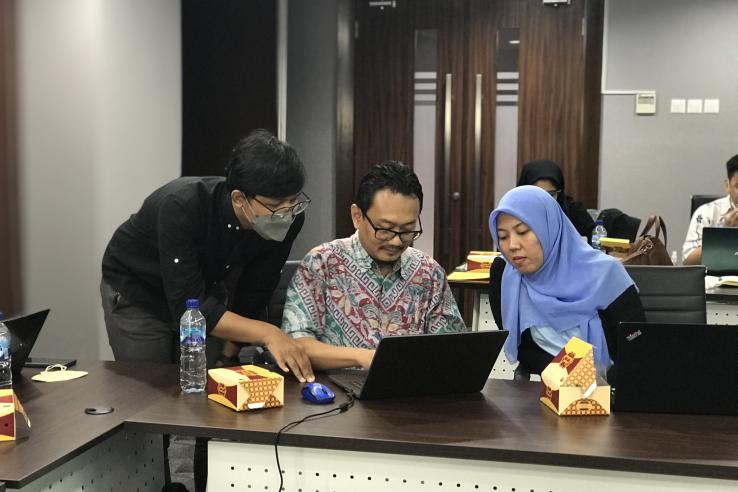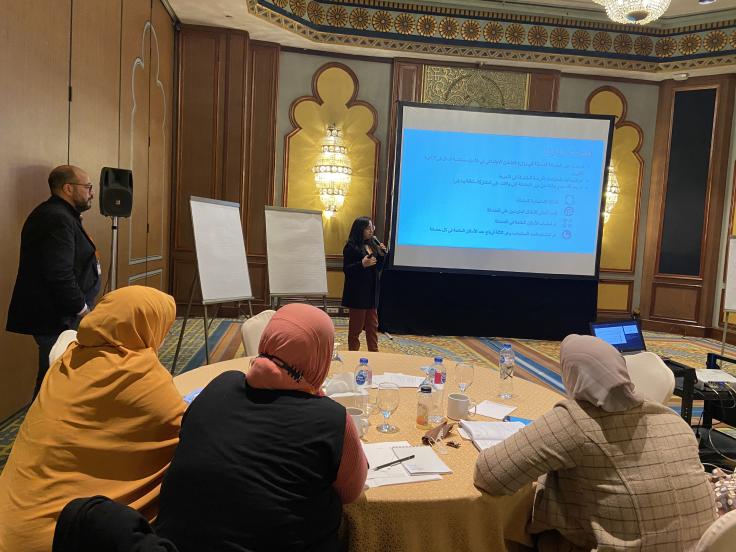
Tailoring training modules to strengthen evaluation partnerships: J-PAL’s custom courses

This is the second blog in a series illustrating stories of how J-PAL’s training courses have built new policy and research partnerships and strengthened existing ones to advance evidence-informed decision-making. The first blog in the series highlights two meaningful examples from J-PAL’s Evaluating Social Programs course participants, the third illustrates how online course participants applied learnings at their organizations, and the fourth shares how training activities within J-PAL's evaluation incubators helped partners engage more deeply with research design.
Through our custom courses, J-PAL works in close partnership with organizations to tailor our training materials on using and producing rigorous evidence to meet specific interests and learning goals. This can include customizing content to a particular sector, geographic area, or level of technical detail, such as a workshop on strategies to measure gender outcomes for practitioners working on gender-related programs in South Asia. These tailored offerings enable participants to engage with examples that resonate with their experiences and equip them to apply learnings to their work.
Many of our custom course partners include government ministries, non-governmental organizations, and multilateral organizations that hope to establish evaluation strategies for the social programs they implement. Custom courses can offer both theoretical and practical guidance to organizations through critical stages of their programs’ evaluation cycles, from developing a theory of change and measurement strategy to using evidence in program decision-making.
This blog showcases two examples of how custom courses contributed to meaningful research and policy partnerships by building evaluation skills. These represent two out of the hundreds of custom courses J-PAL has held for thousands of participants around the world: with courses delivered in Arabic, English, French, Indonesian, Portuguese, and Spanish, J-PAL’s past custom courses span across forty countries, from Argentina to Vietnam.
Building data collection and analysis skills for implementation monitoring in Indonesia
Since 2021, J-PAL Southeast Asia has worked closely with the Center of Education Standards and Policy (PSKP) within the Ministry of Education, Culture, Research, and Technology of Indonesia to evaluate the impact of their Empowering Schools Program on learning outcomes. This program encompasses an integrated set of interventions to transform teaching and school management practices. Through this collaboration, J-PAL Southeast Asia learned about the PSKP’s ongoing process monitoring activities. Drawing on J-PAL’s experience collecting and analyzing quantitative data, J-PAL Southeast Asia partnered with the PSKP to develop a custom training series to share best practices and support the PSKP in conducting a survey to monitor the nationwide implementation of the Empowering Schools Program.
The training series, delivered throughout 2022 and 2023, provided an overview of basic monitoring and evaluation concepts, including survey development, sampling and sample size, and data management and analysis. In addition to in-class training, J-PAL research staff served as discussion partners to provide examples and inputs based on real cases faced by the PSKP. For example, in meetings with the PSKP on their survey questions and sampling, M. Thoriq Akbar, Senior Research Associate at J-PAL Southeast Asia, offered practical guidance on how to draw samples based on the PSKP’s list of participating schools and how to rephrase ambiguous survey questions.
When evaluating the Empowering Schools Program, quantitative data management and analysis is a crucial component to monitor the process and measure the impact. This training provides an alternative tool for us to manage and analyze our data.
- Bakti Utama, training participant from the PSKP, Ministry of Education, Culture, Research, and Technology

Deepening a partnership for evaluating early childhood programs in Egypt
In collaboration with the Egyptian Ministry of Social Solidarity (MoSS), J-PAL Middle East and North Africa (MENA) co-designed a randomized evaluation to test the impact of providing childcare subsidies and employment services on women’s employment and empowerment outcomes, as well as children’s cognitive and socioemotional skills. To ensure the success of this collaboration and strengthen capacities for producing and using evidence, MoSS requested a tailored training for monitoring and evaluation specialists and implementers of the program.
J-PAL MENA organized a two-day training workshop for Ministry staff in January 2022 to provide foundational knowledge on randomized evaluations tailored to the Egyptian context. After covering considerations for why, when, and how to conduct a randomized evaluation through lectures and interactive case studies, the final session offered a deep-dive into the ongoing evaluation of the subsidized access to nurseries program. This created an opportunity for participants to learn more about research design and implementation decisions, contribute new perspectives, and clarify important details of the study. Participants shared positive feedback on the workshop and came away with a deeper understanding of how the evaluation will lead to actionable insights for the program and their work.
The training proved to be highly beneficial for the Ministry staff as it provided them with a comprehensive understanding of how randomized evaluations can effectively evaluate national programs. The staff also acquired practical skills that would enable them to support the current study co-designed with J-PAL MENA. Based on these positive outcomes, we believe that randomized evaluations can serve as a valuable tool to evaluate other early childhood programs in the country.
- Mohsen Nagy, Early Childhood Development National Program Manager, MoSS, and training participant
Strengthening partnerships through custom course collaborations
Through customized training modules and discussions, J-PAL training teams are able to share relevant experiences and provide timely inputs to support partners’ objectives, forging relationships for evidence use beyond a single randomized evaluation. Custom courses support partners in pursuing rigorous monitoring and evaluation, which strengthens the culture of evidence-informed decision-making in their institutions.
Interested in learning how J-PAL can design a custom course for your organization? Visit our custom courses page to learn more and get in touch with our team.




